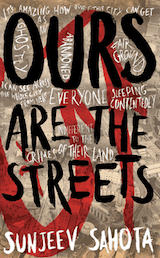Ours Are the Streets
Sunjeev Sahota
|
Here’s another suicide bomber novel seeking to explain Islamist violence as a form of mental illness. We’ve had Amis and Updike’s uninformed attempts, plus variations on the theme from Sebastian Faulks. This time, though not of Muslim background, our author is a British-Asian and he does have some important insights into the anguished inbetweenness suffered by so many second-generation immigrants, which in some rare cases may constitute part of the psychological background to political radicalisation. As a study of migrants, the frustrated ambition of the first generation and the generalised alienation of the second, from the “home country” as much as from “home”– this could equally well be titled Ours Are Not the Streets – the novel is very successful. People from a variety of backgrounds will recognise the complex allegiances of Imtiaz, the protagonist, who “felt fine rooting for Liverpool, in a quiet way, but not England”, and who finds himself “defending Muslims against whites and whites against Muslims”. Any reader will appreciate Sahota’s deft treatment of the generation gap. Imtiaz’s repeated “why can’t you be normal?” is a common adolescent interrogation of parents, but one that becomes more acute in an immigrant household. Sahota is very good at dramatising children’s rankling shame at their migrant parents’ submission to humiliation. Imtiaz’s father’s silence when a passenger pisses in the back of his cab, or when a member of a hen party demands he grope her breasts, and Imtiaz’s squirming response to the silence, are excruciatingly well written. Imtiaz is really very British. He stands up to his parents and marries Becka, his pregnant white girlfriend, who happily converts to Islam and moves into the family home. They have a daughter, Noor. Imtiaz, not assimilated but reasonably comfortably integrated, seems to have it all. Then his father’s death (from a heart attack, while chasing a fare-dodger) leads to an extended visit to Pakistan. This return to the roots should be empowering. In Lahore airport Imtiaz for the first time sees his mother standing up for herself, understanding the social codes, feeling entitled. There are some very well-observed scenes in the ancestral village, as Imtiaz learns about his parents’ early lives, mucks in with agricultural work, and attempts to insert himself into an authentic tradition. In the village, “I were always so and so’s grandson or such and such’s nephew or whatever. I were never just me, on my own . . . And I loved that. It were like for the first time I had an actual real past, with real people who’d lived real lives. Now I think that maybe when Noor takes her kids back home . . . they’ll sit in the shade of a banyan tree and listen open-mouthed to stories of the struggle that I, their baba, were part of.” This is accurate analysis, as relevant to certain natives of the rapidly transforming Muslim world as to those transplanted abroad, of the felt loss of belonging, the aching absence of a “real past”, and the corresponding urge to build a substitute narrative (“the struggle”). But is it enough to justify the turn the story now takes? Aaqil, a villager who likes a bhang lassi, neither politically articulate nor particularly religious, brings Imtiaz to a jihadi camp in Afghanistan. First he ruffles Imtiaz’s feathers by considering him a foreigner. Disproving his foreignness now becomes the prime motivator for Imtiaz’s radicalisation. Yet the famed “radicalisation process” almost doesn’t happen at all. Madness encroaches, fair enough. But precisely how Imtiaz moves from passive support for attacks on American soldiers in Afghanistan to actively planning an attack on civilians in his home town is not made clear. Identity confusion isn’t enough: it doesn’t stop him laughing off suggestions that he take a second wife. Informing the reader that Imtiaz is a Deobandi Muslim again provides insufficient political context, as does a line about Britain’s people sleeping contentedly, indifferent to the crimes of their land. In this respect the novel slips into the predictable pattern of the emerging bomber-in-analysis novel, into what the Africa expert Mahmood Mamdani calls “culture talk”, the psychological and cultural over-explanation of politically motivated actions. Ours Are the Streets has a sprightly pace, rich characterisation and a distinct voice, and its scenes are tightly controlled. Stretching his material to fit the topical frame (“the story behind the news story,” as the blurb has it, “a story for our times”) will perhaps bring Sunjeev Sahota to a wider audience, which would not be a bad thing. But it rips a hole in the text, and tends to trivialise the author’s very real talents. Robin Yassin-Kassab | 8 January 2011| The Guardian Sunjeev Sahota
|


